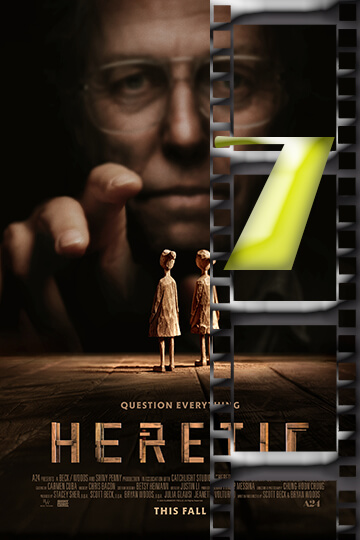

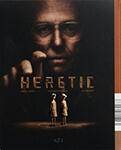
What’s It About
Follows two young women of religion who are drawn into a game of cat and mouse in the house of a strange man.
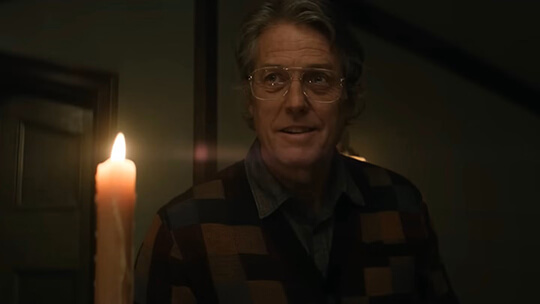
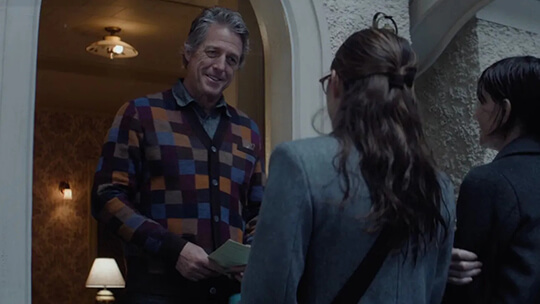
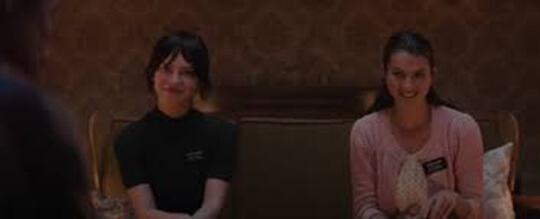
MOVIESinMO REVIEW
Furthest in the cultural backwoods of religious horror is “Heretic,” A24’s latest foray into psychological horror that debuted in cinemas last fall. As a Black film critic taking in this production, I was enthralled by its technical precision even as I wondered at its depictions of religion, power, and the nature of belief—concerns that hit deeply within much Black religious life and experience. Director Bryan Woods and Scott Beck, former writers of “A Quiet Place,” have crafted an apparently simple premise into something that works with meticulous detail. Hugh Grant, more disturbingly than ever, plays a mysterious homeowner who invites two Mormon missionaries (Sophie Thatcher and Chloe East) into his isolated home for what is a horrific game of theological verbal combat. From the moment Grant’s character invites us in by opening his door, there is an undeniable tension that lingers over all interactions. The first act of the movie masterfully plays games with expectation—are we watching a predator tucker with dupe prey, or something more metaphysical at play? It is the film’s greatest strength. The cinematography needs to be especially singled out. Shooting quite so much in one place, the camera brings stifling closeness, as carefully selected lighting transforms Grant’s modernist abode from welcoming to claustrophobic as day slowly becomes night. The sound design complements the shift—incremental in the beginning with creaking boards and ticking watches, before blossoming into something considerably more disturbing. For African-American viewers who come from societies in which religion is both shelter and survival tactic, the film’s exploration of religious faith comes close to home. The steadfast beliefs of the young missionaries, even as they are methodically torn apart, resonates with something I’ve learned from my people—the power of belief as anchor and shield against a threatening world. When Grant’s character begins to deconstruct their theological assumptions, it is not intellectual analysis but existential assault. Despite not having Black central characters (a missed opportunity), its power dynamics and subversion of traditional hierarchies thematic issues resonates with marginal conditions. The film flips on its head the standard missionary trope—these young women are on a mission to convert but find themselves more and more unsure of what is real, who is powerful, and whether their religion can endure it. Hugh Grant is deserving of all the awards he gets for his performance. Older fans will be amazed at how much he can push his own familiar self as dashing romantic hero to something quite more evil. The classic Grant stammer and self-downing are there but are refashioned as psychological tools. His character’s acquired deconstruction of religious ideology is like watching someone pull the threads out of a sweater—casual, methodical, and ultimately destroying. Sophie Thatcher as the veteran missionary delivers a performance that is commendably subtle. Her own experience from aggressive proselytising to spiritual crisis unfolds with agonised realism. Her eyes reveal everything as conviction disintegrates into terror, then something else. Chloe East as the newer missionary is well used as her less guarded way with faith presents other vulnerabilities Grant’s character sensibly exploits. The dialogue is biting, the theological arguments never pedagogic but rather an exercise in psychological warfare by the character of Grant using Mormon doctrine and history against the very people tasked with promulgating them. The film avoids facile denunciation of a particular religion and instead examines the universal human search for meaning and the horror which results when certainties are destroyed. Where “Heretic” fails sometimes is in its third act. Having built such lovely tension, the ending introduces supernatural elements that, while well executed, take somewhat away from the psychological horror that precedes them. The uncertainty of the film was its strength; providing it with definitive answers weakens its power. Culturally, I found myself wondering about how the analysis of faith under duress in the movie correlates with previous Black religious histories. Black communities have generally maintained faith through tests impossible to pass—from slavery to Jim Crow and beyond. “Heretic” inadvertently gestures toward the difference between faith put to the test by secular intellectualism and faith forged through resistance. The former can be explained away; the latter’s foundations are too deep for argumentation alone to erase. Production design should be particularly noted. Grant’s character’s home is stocked with art and antiques that at first glance seem to indicate costly taste but that gradually are shown to be carefully chosen psychological stimuli. One of the paintings of martyrdom becomes increasingly significant as the story progresses, its significance changing with our understanding of the host’s actual plans. Beck and Woods exercise admirable restraint, letting terror mount through dialogue instead of jump scares. Violence erupts only when it’s startling for its contrast with the intelligent horror that pervades the film. The filmmakers realize that horror is not about what’s revealed but what’s implied—the areas between certainties where uncertainty thrives. By the last scene of the movie, we have witnessed not only a battle for existence but a conflict of types of religion—institutional and personal, hard and soft. The missionary’s journey prompts us to query what remains after essential beliefs have been turned inside out. To so many Black audiences who’ve had to mediate difficult alliances with religious systems that liberate and ensnare us both, this wondering will be plausible. “Heresy” joins the pantheon of intelligent horror films that use genre convention to investigate profound philosophical inquiry. It sits among movies like “Saint Maud” and “The Witch” in its sincere treatment of religion as potential salvation and potential confinement. Although at times it jettisons subtlety in favor of shock, it is nonetheless a provoking analysis of what happens when unchallenged belief runs up against unremitting opposition. For those who like frights to be straightforward, “Heretic” will be too cerebral. But for viewers who are willing to excavate its more nuanced questions about the nature of faith and the nature of reality, it has rewards that linger long after the credits have ceased to roll. As the best horror, it uses fright to push us to confront unpleasant truths—about religion, about power, and about our frantic efforts to impose meaning on a world that is often meaningless.
OUR RATING – A DEEP-ROOTED 7
MEDIA
- Genre – Thriller
- Street date
- Digital – December 10, 2024
- Blu-Ray – January 21, 2025
- Video – 1080p
- Screen size 2.39:1
- Sound – English Dolby Atmos
- Subtitles – English SDH, Spanish, French
Extras
- DOLBY ATMOS AUDIO TRACK
- Audio commentary with Scott Beck and Bryan Woods
- Seeing is Believing: Behind the scenes of Heretic
- On set Photography by Kimberly French
- Optional English SDH and Spanish subtitles for the main feature

